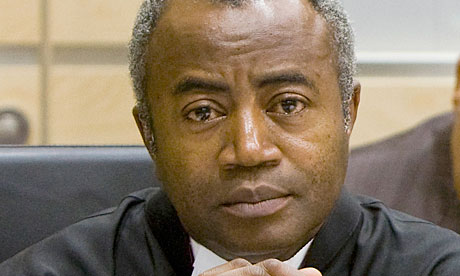- guardian.co.uk,
- Article history

For more than three years, the charismatic defence lawyer Courtenay Griffiths has stood in front of international judges, arguing that former Liberian President Charles Taylor is not responsible for the horrific rapes, murders, and mutilations committed during Sierra Leone's 11 years civil conflict.
This week, Griffiths will walk back into the same courtroom, this time, though, not as a defence lawyer arguing on behalf of his high-profile client, but as a "defendant counsel." Griffiths, himself, has become the subject of a disciplinary hearing before the special court for Sierra Leone.
Griffiths is facing the possibility of sanctions after walking out of court on Tuesday, February 8, when the court had convened to hear closing arguments from both prosecution and defence lawyers in the Taylor trial. Griffiths had protested the judges' decision not to accept the defence final brief, which had been filed late - 20 days after the January 14 deadline.
The brief was late because Griffiths and his team were waiting for decisions from the judges on eight outstanding motions - decisions, Griffiths says, which could have impacted the shape of his closing arguments. Two of the three judges remained unconvinced.
At the closing arguments last week, Griffiths protested, telling the court that he saw no role for himself and Taylor in the proceedings if their final brief was not accepted.
As Griffiths attempted to walk out of court, the presiding judge of the trial chamber, Justice Teresa Doherty ordered him to take his seat.
Ignoring the presiding judge's order, Griffiths walked out of the courtroom. Griffiths also failed to appear in court the next day to make closing arguments for his client. In his absence, judges ordered Griffiths to appear in court on Friday, February 11, to apologise for walking out of court or risk being sanctioned.
Rule 46 of the court's procedural rules (pdf) states that
"A chamber may, after a warning, impose sanctions against or refuse audience to a counsel if, in its opinion, his conduct remains offensive or abusive, obstructs the proceedings, or is otherwise contrary to the interests of justice."Griffiths did appear in court on Friday as directed. But rather than apologise to the court, he requested a special disciplinary hearing where he would be represented by an experienced counsel. The judges accepted Griffith's request. When Griffiths appears as "defendant counsel" tomorrow he will be represented by an American lawyer, Peter Robinson. Like Griffiths, Robinson is also defending a big fish before an international court: Robinson is the defence counsel for former Bosnian president Radovan Karadzic at the international criminal tribunal for the Former Yugoslavia (ICTY). Also like Griffiths, Robinson is no stranger to controversy. In June 2010, he was a subject of contempt proceedings before the international criminal tribunal for Rwanda (ICTR). Robinson, who was defending an accused genocidaire in the 1994 Rwandan massacres, refused to examine a defence witness because of developments outside the courtroom: his co-defense counsel had been arrested in Rwanda on allegations of genocide denial. Robinson asked to withdraw from the case until his colleague was released. The judges at the ICTR denied his request, and, despite being ordered to continue the examination of his witness, Robinson refused. The judges brought contempt proceedings against him, but he was ultimately acquitted. Disciplinary hearings before special court for Sierra Leone judges are not new, either. In December 2005, the trial chamber sentenced Yada Williams, a defence counsel at the special court to a public reprimand and a fine of Le. 1000000 (250 USD) after a disciplinary hearing found that he assaulted a female court staff. Although the circumstances surrounding the disciplinary hearings for Robinson, Williams, and Griffiths are different, the outcomes could have similarities. Griffiths could put up a strong defence for his action, like Robinson did at the ICTY, and the judges could decide that there is no case against him. Alternatively, the judges could find a case of misconduct against him and ask him to apologise. An apology, like that made by Williams in 2005, could save him any further sanctions. A third option could be that Griffiths is found guilty of misconduct and have penalties levelled against him. According to the court's rules, a number of possible sanctions exist. Penalties can include a fine, a report to Griffith's home bar association in the UK, a "refusal of audience" (or inability to present arguments in court), or he could be dismissed as the defence lawyer for his client. A refusal of audience would not bar Griffiths from being Taylor's lead counsel. While he would still be in a position to sign legal documents or file motions on Taylor's behalf, he would not be entitled to actually present arguments in court. If this happens, then Taylor would have to rely on another counsel to make arguments to the judges (including his closing statement), at a sentencing hearing if Taylor is found guilty, or at any appeals hearings after the Trial Chamber's final judgment. If, on the other hand, Griffiths is declared ineligible to represent Taylor, the former Liberian president would need to look for another lawyer to finish the case. For any sanction imposed on Griffiths, he would be able to appeal it to the appeals chamber of the special court for Sierra Leone. Any such appeal might delay proceedings in the trial further, as a final determination by the appeal chamber might be needed to work out who will conclude Taylor's defence. Whatever the outcome of this hearing, it makes its own contribution to the many dramatic events that have unfolded in this war crimes trial. This hearing will see Griffiths, the charismatic lawyer who has fiercely defended the interest of his client, become a client himself. Whoever thought that Griffiths would need a lawyer? Or become a client like Taylor? What a way to wear someone else's shoes.

No comments:
Post a Comment